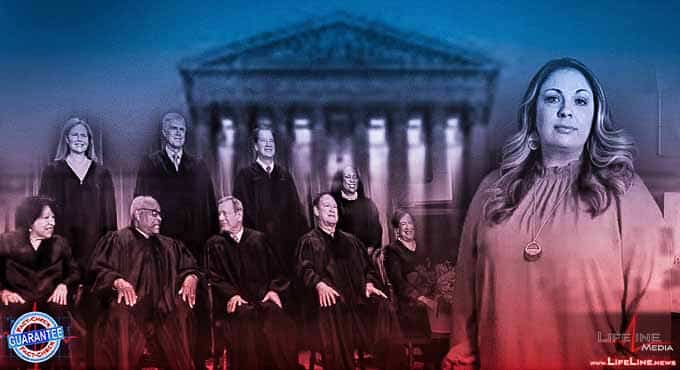
FACT-CHECK GUARANTEE
Political Tilt
& Emotional Tone
The article exhibits a conservative bias, highlighting the victories of conservative justices in the US Supreme Court and ending with a positive note for conservatives.
Generated using artificial intelligence.
The emotional tone is slightly positive, focusing on the triumphs of conservative causes in recent Supreme Court rulings.
Generated using artificial intelligence.
Updated:
Read
| By Richard Ahern — It’s a collision between the right of an artist to adhere to her religious beliefs versus the right of same-sex couples to be free from discrimination.
The US Supreme Court has stepped into the arena:
Lorie Smith, a Colorado graphic designer, declined to design wedding websites for same-sex couples due to her Christian faith. Colorado law, however, bars businesses from refusing services based on sexual orientation.
But the Supreme Court has made another historic ruling saying that artists should not be forced to communicate messages that clash with their religious values.
The ruling made on Friday raised eyebrows in the LGBT community but was praised by conservatives.
Here’s how the Justices lined up:
The six conservative justices supported Smith’s right to refuse service if it clashed with her religious beliefs. The court’s three liberals, on the other hand, disagreed.
Justice Neil Gorsuch, penning the majority opinion, emphasized that the First Amendment safeguards the freedom to think and speak independently without governmental intrusion.
Justice Sonia Sotomayor, dissenting, called it a “sad day” for American constitutional law and the LGBT community. She lamented that a public business now holds the constitutional right to deny service to “a protected class.”
What’s this reminiscent of?
Many will remember the 2018 case involving Colorado baker Jack Phillips who didn’t want to make a cake for a same-sex wedding due to his religious beliefs. The court narrowly sided with him but didn’t address whether states can broadly enforce public accommodation laws.
This decision marks a significant moment in American jurisprudence, clearly drawing the line between religious freedom and anti-discrimination protections.
It comes after another recent landmark decision, where the Supreme Court’s majority declared race-conscious admissions programs unconstitutional, ending affirmative action in US universities.
Chief Justice Roberts, authoring the majority opinion, contended that these programs negatively utilize race and engage in racial stereotyping. The three liberal justices objected, with Justice Sotomayor asserting that the ruling reinforces racial inequality in education.
That’s not all:
In another 6-3 decision this week, the US Supreme Court nullified President Joe Biden’s initiative to erase billions in student debt. The plan aimed to forgive roughly $10,000 per borrower, with the potential for double in some instances.
However, conservative states contended that Biden exceeded his authority, a stance the Supreme Court concurred with.
All in all — an excellent week for conservatives!

Join the discussion!